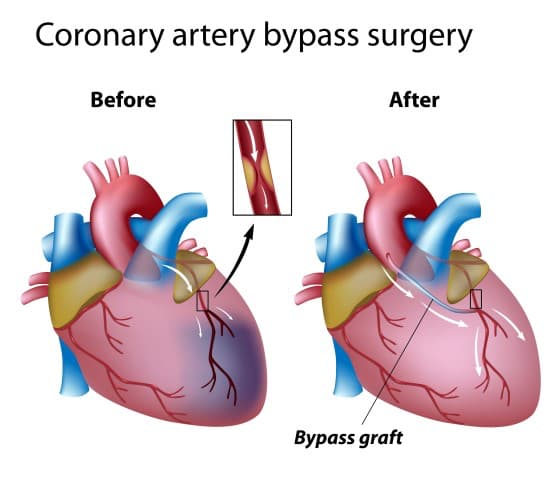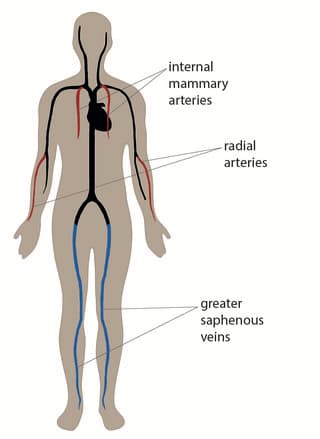How Harley Street Can Help With Your Heart Bypass Surgery?
By Michael MacDonald

Coronary artery disease is incredibly common and unfortunately causes 1 in 3 deaths. One of the treatments for severe coronary artery disease is to undergo a coronary artery bypass graft (CABG). This surgery bypasses the blockages in the heart arteries allowing you to return to a more normal way of life.

What is Heart Bypass Surgery?
Heart bypass surgery is a surgical intervention where it 'bypasses' blocked coronary arteries using a vein or artery harvested from other body parts. The operation revives the blood flow to the heart; therefore, restoring cardiac function and improving angina symptoms.
Coronary artery bypass grafting (CABG) is another term for heart bypass surgery.
The procedure utilizes the following conduits as bypass grafts:
- Left (or right) internal mammary artery – most common
- Saphenous vein in the leg – most common
- Radial artery
- Gastroepiploic artery (in the stomach)
Why Does Your Doctor Recommend Heart Bypass Surgery?
Heart bypass surgery manages and treats blocked coronary arteries. When plaque or blockage is present in these blood vessels, it affects the blood perfusion to the heart. This leads to ischemia, damage, or death of the heart muscles. Angina is the symptom of chest pain on exertion/stress that is caused by the ischemia. If one of these plaques gets inflamed and ruptures it can cause an acute blockage in the artery – heart attack. Bypass surgery reduces the symptoms of angina and reduces the risk of heart attacks.
Most simple blockages can be dealt with using stents however, some cannot, and need to be treated with a bypass. If this is the case, your Harley Street cardiologist will refer you to a cardiac surgeon.
Indications of Heart bypass surgery:
| Multiple blocked vessels |
| Inability to treat with stents |
| Heart dysfunction with coronary artery disease |
Over time, fatty deposits build up (atherosclerosis) in the arteries, especially with age, smoking, obesity, and sedentary lifestyle. Such manner increases the chance of developing heart disease that provokes chest pain or angina.
It is possible to manage the early stage of atherosclerosis through conservative measures. Eating a healthy diet, staying active, and medications can halt the plaque build-up. However, surgery may be needed if symptoms do not improve.
How Will I Prepare for Heart Bypass Surgery?
Heart bypass surgery is a major operation. Thus, pre-operatively some tests will need to be done.
- A blood test, which shows complete blood count, coagulation, liver function, sugar levels, and cross match in case you need a transfusion
- Electrocardiogram (ECG)
- Chest X-ray
- CT Scan for arterial or vein mapping
- Coronary angiogram/angiography to determine the extent of blockages
On the day of surgery, they will ask you to wear a hospital gown. They will also create intravenous access in your hand or arm. Theatre staff will use clippers to trim the hair on the surgical sites.
During the surgery you will undergo a general anesthetic and the work of your heart and lungs will be taken over by a heart lung bypass machine. After the surgery you will be admitted to intensive care until you wake up. You will probably be in hospital for around a week while you recover.
Is Heart Bypass Surgery Safe?

Heart bypass surgery is a common procedure in Singapore and many parts of the world. However, just like any other surgical intervention, it has risks and complications. Keep in mind that there are many patient factors to consider for problems to occur after surgery. For example, people with diabetes and existing health conditions are more likely to experience wound infection following Heart bypass surgery.
Besides abnormal heart rhythm and wound infections, complications of Heart bypass surgery include stroke, kidney problems, and death. There is also a possibility of graft failure within thirty (30) days of surgery.
With Harley Street, we will endeavor to guide you in your surgery until your recovery. We are a team of highly skilled cardiovascular doctors with extensive training and a proven track record of experience. We know how Heart bypass surgery is crucial to you. At Harley Street, you are in safe hands. You commit to us, and we commit to improving the quality of your life.
Conclusion
Heart bypass surgery is a major operation. However, sometimes it is a necessary operation when blockages in the coronary arteries cannot be treated with stents. It is one of the most commonly performed heart operations, and provides excellent long-term outcomes for the majority of people.

